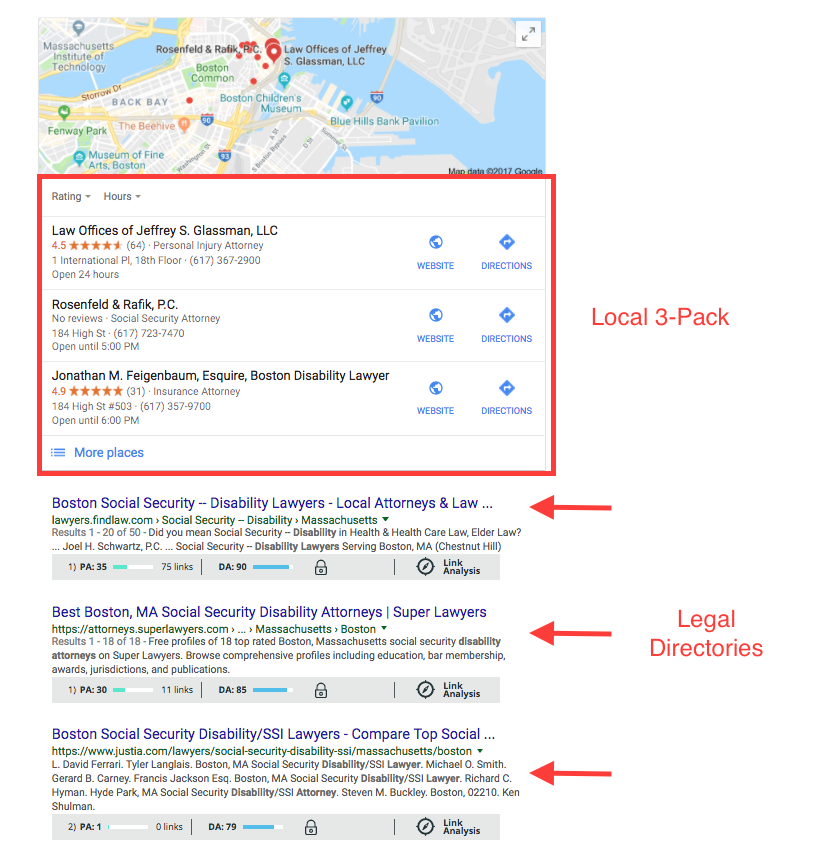Digital marketing for a law firm can be challenging, especially when trying to get more unpaid (organic) traffic to your website. Google considers hundreds of factors when determining who should show up as the #1 search result for a claimant’s query. Here are five factors that help determine how many unpaid users visit your website:
1. Length of Content
Quality content is always important for a law firm. If a user finds just a sentence or two about your firm and your ability to help someone win a claim, it’s possible you’ll be penalized for having “thin content,” or content that’s short, low quality, and overall unhelpful. Use your legal expertise to add quality content online and you should see more users find your site organically.
Keep in mind that Google does take page type into consideration. For example, there’s no need to write a novel for a “Contact Us” page, as these types of pages really only need an address, phone number, and a contact form.
2. Your Backlink Profile
When Google sees another domain linking to your firm’s website, you’re essentially receiving a “thumbs up,” or a vote of confidence, from the other site. If your firm has dozens of links from high-quality websites, you may outperform competitors with similar content practicing in the same area of law.
So how do you get backlinks to your website? Adding high-quality content is the most favorable method. In an ideal world, you’ll publish a blog relevant to your area of law and dozens of websites link to it. Realistically speaking this rarely happens, so you may need to participate in some link building efforts to get more backlinks.
3. Local Search
When a claimant tries to find an attorney, firms located in his or her area are usually given priority over nationwide firms in search results. Google displays what’s called a “local 3-pack” above major websites serving claimants across the country.

So how can you rank for local search? Simply filling in the basics, like having an updated address and using the same firm name across your website is a great start. You can also claim your business on local directories like Yelp or Google’s My Business to ensure Google knows where you are.
4. Page Load Speed
Google is focusing more and more on user experience. This means that if claimants find your site but aren’t satisfied with the results, you’ll suffer accordingly. One of the biggest user experience ranking factors is the speed at which your website loads. According to Kissmetrics, 25% of users will leave a website that takes longer than four seconds to load, and the abandonment rate only increases from there.
So how can you increase your site speed? There are many ways to help your pages load faster. You can compress your images or simply make them smaller and easier to load. Removing social media plugins or “Like Our Page” boxes helps as well. Finally, consider using a different hosting company—the server you use to maintain your website may not be performing as well as you need.
5. Domain Age
This is a very simple and straightforward ranking factor. Older domains usually perform better than new websites, as Google views old domains as established businesses serving their audiences for years. Because older domains may receive more organic traffic than a new website, it’s important to launch a website as quickly as possible once you’ve decided to invest time in digital marketing.
6. HTTPS vs. HTTP
Google prefers HTTPS to HTTP. What’s the difference between the two? The “S” at the end of HTTPS stands for secure. This means that any information entered onto your website’s contact form will be encrypted data. Google has stressed the importance of using HTTPS since 2014. This is especially true for Social Security disability attorneys, as they often receive medical information and case descriptions from potential claimants.
There are hundreds of ranking factors that can affect your firm! While Google changes its algorithm every day, it’s important to note that the general rule of thumb for creating a website that ranks well is to simply add high-quality, useful content online. If you’re able to inform and assist potential claimants, you’ll avoid any potential Google search penalties.
Source: https://blog.kissmetrics.com/loading-time/?wide=1